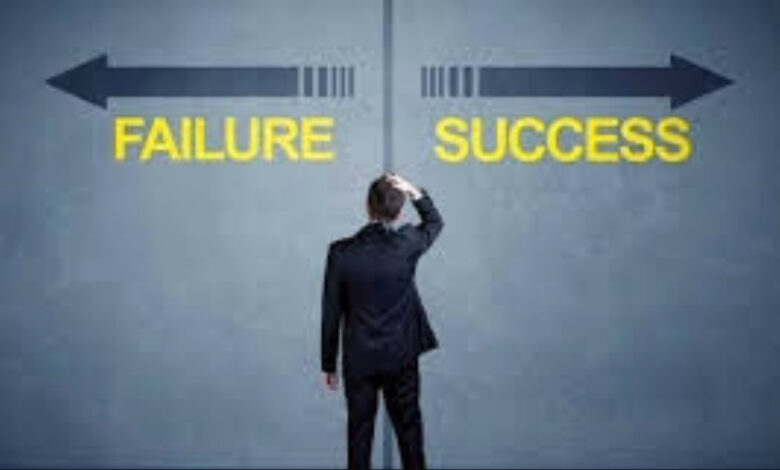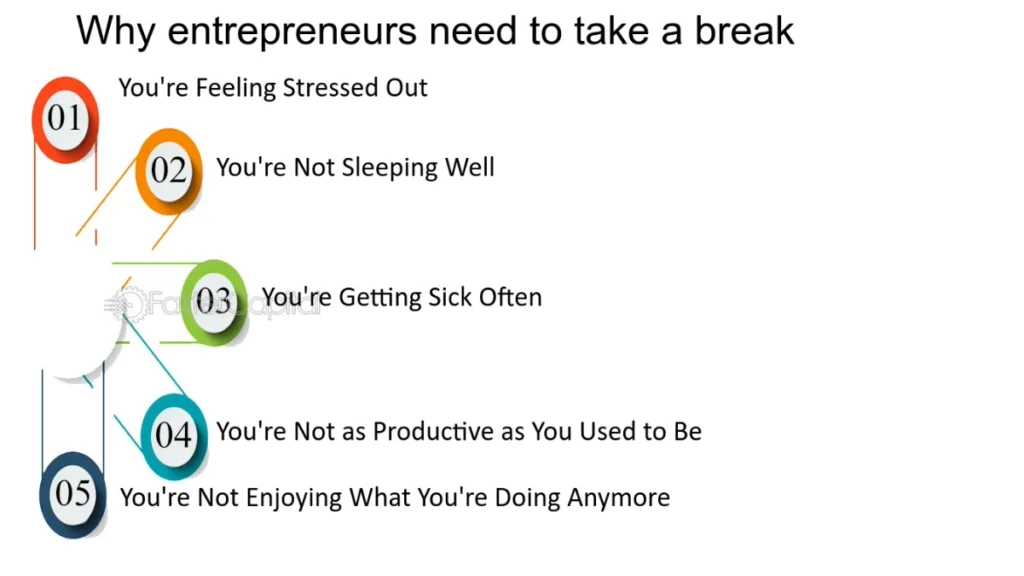Why Do Entrepreneurs Breaks? The Hidden Costs of Non-Stop Hustle

Entrepreneurs Breaks Many founders fall into the trap of believing that more hours = more success. But research tells a different story:
- A Stanford study found that productivity drops sharply after 50 hours per week
- 72% of Entrepreneurs Breaks report mental health struggles (University of San Francisco)
- Chronic stress impairs decision-making, creativity, and leadership (Harvard Business Review)
Elon Musk, Arianna Huffington, and Bill Gates have all publicly emphasized the importance of rest, reflection, and disconnection—not just for health, but for sustained business growth.
5 Surprising Benefits of Taking an Entrepreneurial Break

1. Boosted Creativity & Innovation
When you’re constantly in execution mode, Entrepreneurs Breaks your brain defaults to familiar patterns. Stepping away:
✅ Triggers “divergent thinking” (fresh ideas emerge)
✅ Allows subconscious problem-solving (ever had a breakthrough in the shower?)
✅ Helps you see the bigger picture instead of getting stuck in daily fires
Example: Twitter co-founder Jack Dorsey took regular meditation retreats—which led to the idea for Square.
2. Higher Productivity (Yes, Really)
Working longer ≠ working smarter. Studies show that after vacations:
✔ Employees are 13% more productive (Harvard)
✔ Decision-making improves by 50%+ (Arizona State University)
Entrepreneurs Breaks who schedule downtime accomplish more in less time because they return focused and energized.
3. Better Business Clarity & Strategy
When you’re too close to the grind, you miss:
🔍 Inefficiencies (What systems could be automated?)
🔍 New opportunities (What’s shifting in your industry?)
🔍 Real priorities (Are you working on the business or just in it?)
Tip: A 3-day “thinking retreat” (no emails, just strategy) can revolutionize your direction.
4. Reduced Burnout & Health Risks
Entrepreneurs Breaks face:
⚠ 2x higher depression rates than the general population
⚠ Chronic stress leading to heart disease, insomnia, and anxiety
⚠ “Founder’s Fatigue”—exhaustion that tanks company culture
Breaks lower cortisol, improves sleep, and restores motivation.
5. Stronger Leadership & Team Growth
If you never step back, you create:
❌ A bottleneck (team depends on you for every decision)
❌ A culture of overwork (employees mimic your unsustainable habits)
Taking breaks forces delegation builds trust, and develops future leaders.
How to Take a Break Without Hurting Your Business
Many Entrepreneurs Breaks entrepreneurs avoid breaks because they fear:
- “Everything will fall apart without me”
- “I’ll miss a big opportunity”
- “Clients will think I’m unreliable”
Here’s how to pause strategically:
1. Start Small (Micro-Breaks Work Too!)
- 90-minute focus sprints followed by 20-minute breaks
- One full weekend offline per month
- “No-Meeting Wednesdays” for deep work or rest
2. Automate & Delegate First
- Set up auto-responders (“I’m offline until X date for strategic planning”)
- Train a second-in-command to handle emergencies
- Use tools like Zapier or Asana to keep workflows running
3. Plan Around Natural Lulls
- Slow seasons
- After a big product launch
- Between funding rounds
4. Communicate Transparently
Example email to clients:
“I’m taking [X days] to recharge and work on the business. During this time, [Team Member] will handle urgent requests. I’ll return refreshed with even better ideas for you!”
5. Make It a Non-Negotiable Habit
- Schedule breaks in advance (like a CEO would a board meeting)
- Track how breaks improve your metrics (e.g., “After 3 days off, I closed 2 new deals”)
Real Entrepreneurs Who Scaled Success After Breaking
Case 1: Basecamp’s 4-Day Workweeks
- The SaaS company grew to $100M+ revenue with 32-hour summer weeks
- Result: Happier teams, higher output
Case 2: Patagonia’s “Let My People Go Surfing” Policy
- Founder Yvon Chouinard built a $1B brand by prioritizing outdoor time
- Employees report 87% job satisfaction
Case 3: Tim Ferriss’ “Mini-Retirements”
- The 4-Hour Workweek author takes 3-month breaks between projects
- Says these pauses lead to his best business ideas
What Science Says About Optimal Break Rhythms
Research-backed rest schedules for Entrepreneurs Breaks:
Break Type Frequency Benefits
Daily micro-breaks Every 90 minutes Prevent decision fatigue
Weekly digital detox 1 full day off Resets the nervous system
Quarterly retreats 3-5 days Strategic clarity
Annual sabbaticals 2-4 weeks Prevents burnout
1. How often should Entrepreneurs Breaks take breaks to stay productive?
Research shows daily micro-breaks (every 90 minutes), weekly digital detoxes (1 full day off), and quarterly retreats (3-5 days) create optimal productivity rhythms. The key is consistency rather than duration.
2. Won’t taking breaks make me fall behind competitors?
Strategic breaks give you a competitive edge. Studies reveal that rested Entrepreneurs Breaks make better decisions (50%+ improvement) and spot opportunities faster. Your competitors grinding 24/7 are likely making tired mistakes.
3. What’s the best way to disconnect when I’m used to always working?
Start with “no-business zones”: no emails after 7 PM, device-free meals, or weekend mornings completely offline. Use apps like Freedom to block work tools during breaks. Gradually increase to full days off.
4. How can I prepare my team before taking an extended break?
Implement the “3D System”: Document (processes), Delegate (with clear authority limits), and Do a trial run (1-2 day test absence). This builds team confidence and reveals operational gaps to fix.
5. Are certain types of breaks more beneficial than others?
Active breaks (exercise, hobbies, nature) provide 2-3x more cognitive restoration than passive screen time. The most rejuvenating breaks combine physical movement, novelty, and complete work disconnection.